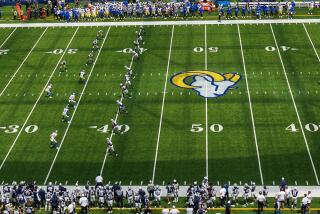Pac-10 Teams Prepare for Quick Whistle
- Share via
College basketball fans may have to bring more than their spirit to the games this season.
They may also need a rule book.
Pacific 10 Commissioner Thomas Hansen said Wednesday college referees will be calling games much tighter in the conference--and across the country--in an effort to eliminate rough play.
Hansen, speaking at the annual Pac-10 basketball media day at the Los Angeles Airport Marriott, said men’s basketball officiating supervisor Lou Campanelli has given the conference’s referees a mandate to clean up the game.
In other words, Hansen said, they will be blowing the whistles early and often.
“We realize the games could be long and ugly in November until players and coaches adjust,” Hansen said. “But the coaches have bought into this notion that this is a national effort for a fundamental change in the game.”
He said the action was spurred, in part, by the NCAA championship semifinal between Wisconsin and Michigan State that had a 19-15 score at halftime.
“That’s the kind of basketball we don’t think fans want to see,” Hansen said.
To improve the flow of the game, referees are to cut down the blows in the game, Hansen said. For example, defenders will no longer be able to put their hands or forearms in the backs of dribblers. Players cutting through the lane won’t have to swim through a sea of hip checks or elbows. And the wrestling that goes on between players in the low post trying to establish position will not be allowed.
“If officials are not calling [more] fouls, they know they will be taken to task,” Hansen said.
For their part, coaches and players at the event Wednesday cautiously applauded the plan.
“I don’t think [rough play] is a problem in the Pac-10,” USC Coach Henry Bibby said. “I think the game is rougher in other conferences. But overall . . . it is an issue around the country.
“We’ve had a couple of scrimmages where the refs were calling so many fouls I said, ‘We’re here to play ball, not shoot free throws,’ ” said Oregon Coach Ernie Kent. “But overall, this is a good thing. And teams will have no choice but to adapt. My concern is what will happen outside our conference. But we know in Pac-10 that the officials have an agenda and won’t deviate from it.
“They don’t have to make new rules,” said Arizona Coach Lute Olson. “There are plenty of rules in the book that haven’t been called. All we want is consistency. . . . We’ll have to get ready for a lot of whistles blowing, and coaches will have to depend more heavily on their depth.” Olson said the main area referees need to concentrate on is underneath the basket. Stanford Coach Mike Montgomery, who has been on the NCAA basketball rules committee for four years, said there have been “plenty of discussions” on why certain infractions were not being called. By letting players get away with grabbing, holding and bumping, it has made it more difficult for coaches to teach proper ways to stop other teams.
“We’ve made kids lazy by letting them get away with [fouls] they don’t get penalized for,” Montgomery said. “They’ve ceased playing defense with their feet. Now it’s all hands and arms.
“Calling more fouls is not revolutionary, it’s an adjustment everyone has to make.”
Sean Lampley, a senior forward at Cal, said it will be tougher for veteran college players to change than it will be for incoming or redshirt freshmen because “they won’t have habits to break.” But he also said restricting the use of hands and arms on defense will open up the game for more scoring.
“I just want to see the games called the same way across the country,” Lampley said. “You don’t want to play one way all season, then have it different in the [NCAA] tournament.”
More to Read
Go beyond the scoreboard
Get the latest on L.A.'s teams in the daily Sports Report newsletter.
You may occasionally receive promotional content from the Los Angeles Times.










